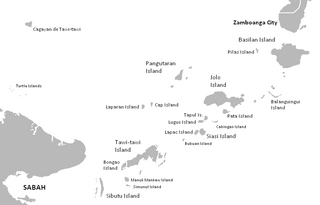Enterprise or USS Enterprise, often referred to as the Starship Enterprise, is the name of several fictional spacecraft, some of which are the main craft and setting for various television series and films in the Star Trek science fiction franchise. The most notable were Captain James T. Kirk's USS Enterprise (NCC-1701) from the original 1960s television series, and Captain Jean-Luc Picard's USS Enterprise (NCC-1701-D) from Star Trek: The Next Generation.

The Sulu Archipelago is a chain of islands in the Pacific Ocean, in the southwestern Philippines. The archipelago forms the northern limit of the Celebes Sea and southern limit of the Sulu Sea. The Sulu Archipelago islands are within the Mindanao island group, consisting of the provinces of Basilan, Sulu, and Tawi-Tawi; hence the archipelago is sometimes referred to as Basulta, derived from the first syllables of the three provinces.

USS Enterprise (CVN-65), formerly CVA(N)-65, is a decommissioned United States Navy aircraft carrier. In 1958, she was the first nuclear-powered aircraft carrier and the eighth United States naval vessel to bear the name. Like her predecessor of World War II fame, she is nicknamed "Big E". At 1,123 feet (342 m), she is the longest naval vessel ever built and the only ship of a class that was originally planned to have five other ships. Her 93,284-long-ton (94,781 t) displacement ranks her class as the third largest carrier class, after the Nimitz class and the Gerald R. Ford class. Enterprise had a crew of some 4,600 service members.

Isabela, officially the City of Isabela, is a 4th class component city (separate) and de facto capital of the province of Basilan, Philippines. According to the 2020 census, it has a population of 130,379 people.

Hikaru Kato Sulu is a fictional character in the Star Trek media franchise. A member of the crew in the original Star Trek series, Sulu also appears in the animated Star Trek series, in the first six Star Trek movies, in one episode of Star Trek: Voyager, and in several books, comics, and video games. Originally known simply as "Sulu", his first name, "Hikaru", appeared in a 1981 novel well over a decade after the original series had ended.

The Moro Rebellion (1899–1913) was an armed conflict between the Moro people and the United States military during the Philippine–American War.

The Sultanate of Sulu was a Sunni Muslim state that ruled the Sulu Archipelago, coastal areas of Zamboanga City and certain portions of Palawan in the today's Philippines, alongside parts of present-day Sabah, North and East Kalimantan in north-eastern Borneo.

The Tausūg, are an ethnic group of the Philippines and Malaysia. A small population can also be found in the northern part of North Kalimantan, Indonesia. The Tausūg are part of the wider political identity of Muslim Filipinos of western Mindanao, the Sulu archipelago, and southern Palawan, collectively referred to as the Moro people. The Tausugs originally had an independent state known as the Sultanate of Sulu, which once exercised sovereignty over the present day provinces of Basilan, Palawan, Sulu, Tawi-Tawi, Zamboanga City, North Kalimantan and the eastern part of Sabah. They are also known in the Malay language as Suluk.

"The Naked Time" is the fourth episode of the first season of the American science fiction television series Star Trek. Written by John D. F. Black and directed by Marc Daniels, it first aired on September 29, 1966.

"Tomorrow Is Yesterday" is the nineteenth episode of the first season of the American science fiction television series Star Trek. Written by D. C. Fontana and directed by Michael O'Herlihy, it first aired on January 26, 1967. It was the first Star Trek episode to be written solely by a woman.
"That Which Survives" is the seventeenth episode of the third season of the American science fiction television series Star Trek. Written by John Meredyth Lucas and directed by Herb Wallerstein, it was first broadcast January 24, 1969.

Jolo is a volcanic island in the southwest Philippines and the primary island of the province of Sulu, on which the capital of the same name is situated. It is located in the Sulu Archipelago, between Borneo and Mindanao, and has a population of approximately 500,000 people.

Star Trek: The Rebel Universe is an action-adventure computer game published by Firebird Software in Europe and Simon & Schuster Interactive in America. It was originally released for the Atari ST in 1987 and was followed the next year with versions for the Commodore 64 and DOS.

The Battle off Mukah was a naval engagement fought in May 1862 between boats of the Sarawak and pirates. After the kidnapping of Sarawakian citizens some time before, two small gunboats encountered the pirates off Mukah on the northern coast of Borneo. In an unusual action, the Rajah Muda, Captain John Brooke, then the heir apparent to be White Rajah of Sarawak, led his force in the defeat of six pirate ships and the rescue of captured civilians.

The Bruneian Civil War was a civil war in the Bruneian Sultanate from 1660 to 1673. Between Abdul Hakkul Mubin and Muhyiddin. During Sultan Muhammad Ali's reign, a dispute led to the killing of Pengiran Muda Alam by Pengiran Muda Bongsu. In retaliation, Abdul Hakkul Mubin killed Muhammad Ali and declared himself the fourteenth sultan. A civil war ensued, with Abdul Hakkul Mubin fleeing to Kinarut. Sultan Muhyiddin sought help from the Sultan of Sulu, promising the area of Kimanis as a reward. As it turns out the Sulu Sultanate made a false claim over the entire Sabah. The dispute over eastern Sabah remains a legacy of this civil war.

The 2013 Lahad Datu standoff, also known as the Lahad Datu incursion or Operation Daulat, was a military conflict in Lahad Datu, Malaysia. The conflict began on 11 February, when 235 militants arrived in Lahad Datu by boat, and ended on 24 March. The militants, self proclaimed as "Royal Security Forces of the Sultanate of Sulu and North Borneo", were sent by a claimant to the throne of the Sultanate of Sulu.

The Capitals–Flyers rivalry is a National Hockey League (NHL) rivalry between the Washington Capitals and Philadelphia Flyers ice hockey clubs. Both teams compete in the NHL's Eastern Conference Metropolitan Division. The two teams have been rivals since the Capitals inception in the 1974–75 season, but became most intense in the 1980s when the Capitals joined the Patrick Division. The rivalry was renewed in the late 2000s and 2010s with both teams being equally competitive resulting in two playoff matches in 2008 and 2016.

The Lahad Datu District is an administrative district in the Malaysian state of Sabah, part of the Tawau Division which includes the districts of Kunak, Lahad Datu, Semporna and Tawau. The capital of the district is in Lahad Datu Town.
The relations between the Ottoman Empire and the United States have a long history having its roots even before the American independence since there was a actually a running trade between these two regions. After the American independence in 1776, the first relations between these two countries started through the contact between the American merchants, statesmen and lastly the Navy and North African countries and with the Ottoman Empire after 1780.
















